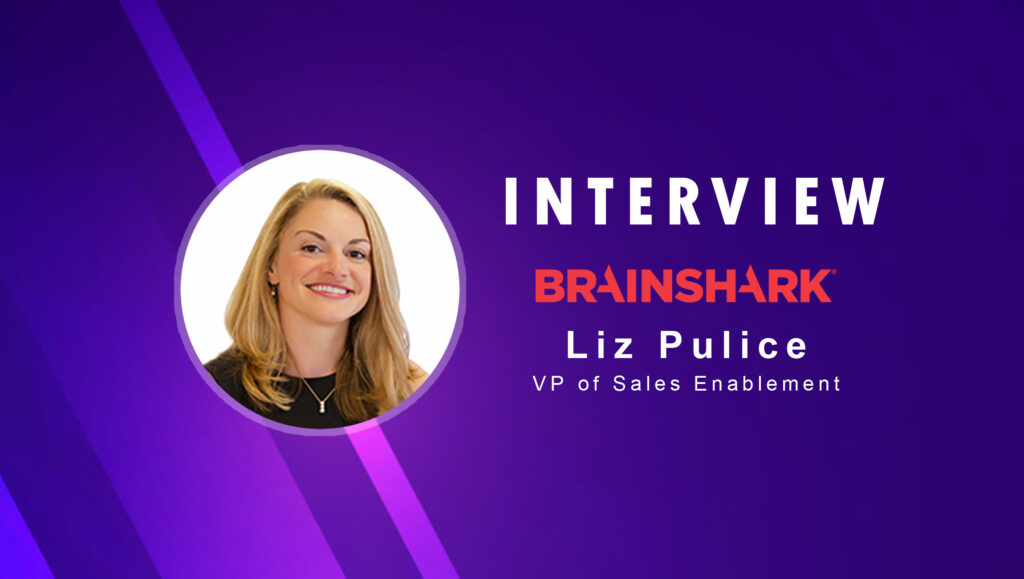When companies build their sales tech stacks, they need to be cognizant of the different roles on their selling teams cautions Liz Pulice, VP of Sales Enablement at Brainshark. Catch the complete QnA to uncover more B2B and Technology sales tips, many of which can help you move the needle more effectively.
_____
Can you tell us a little about yourself, Liz (including your hobbies!) and your journey so far at Brainshark since joining the team in May last year?
I actually started my journey with Brainshark as a Brainshark customer! In fact, I was a Brainshark customer (at multiple organizations) for 11 years before joining the company. I first encountered Brainshark after I got my MBA and joined PTC, where I was responsible for channel development. My first hands-on Brainshark experience came when we had a new product release. My job was to educate our channel partners and their customers on the new solution, and we relied on Brainshark to do it.
From there, it was a natural transition for me to move to sales enablement at PTC. I was already working with sellers and enabling them in their field roles, so I joined the enablement team and have been in working in sales readiness and enablement roles at multiple organizations ever since.
After years of being a Brainshark customer and seeing the value firsthand, I was excited to join Brainshark last May as VP of sales enablement. In this role, I help drive and execute Brainshark’s sales enablement strategy, and oversee the design and delivery of our sales training programs. I also help assess and refine our sales tech stack – with Brainshark’s readiness platform, of course, occupying a central role.
I have some rewarding and unusual hobbies and interests. I will be the first female president of the Waltham, Mass., Lion’s Club this year – which, I suppose, makes me the “First Lioness.” We serve the local community in a number of ways, especially with programs that raise money for eye research and fighting blindness, as well as fighting hunger and helping youth. I’m also a certified therapy dog handler and do therapy engagements at local colleges and universities, particularly around high-stress exam periods.
Read More: SalesTechStar Interview With Kunal Johar, Co-Founder & CTO At OpenWater Inc
Can you describe Brainshark’s approach to sales enablement and readiness? What distinguishes Brainshark’s solutions from others in the market?
Brainshark provides a comprehensive and award-winning platform for sales readiness and enablement. We’re dedicated to preparing organizations with the knowledge and skills they need – so their client-facing teams can perform at the highest levels and deliver maximum value to buyers. Within our SaaS-based platform, we offer solutions for sales training and on-boarding, sales coaching and practice (including manager and AI-powered scoring options), sales content authoring and management, sales readiness scorecards and much more.
We’re unique in our focus on and commitment to data-driven sales readiness and continually take steps in support of this mission – including acquiring sales scorecard provider, Rekener, last year, to give organizations unmatched visibility into the behavior and activities of their sales teams, and drive performance improvements. Our combined platform helps organizations connect sales team readiness to improved revenue.
As a seasoned SaaS Sales professional, what are some of the biggest sales challenges you wish you could change in the industry?
I wish I could offer my sellers a true one-stop shop for everything they need to do their jobs. Ideally, you want sellers out in the field, interacting with customers, documenting what they did, sharing information with the sales organization, organizing next steps with the relevant colleagues, etc. This is difficult to do when you have so many technologies supporting selling processes – there isn’t just one solution that does everything. As a result, sales enablement has to spend a lot of time and energy training sellers on all these different technologies – and it would be so much more efficient across the board if there was one system that could do it all. Some vendors are working toward this nirvana – including Brainshark, which is expanding its capabilities both organically and through acquisitions of companies like Rekener to add integrated, advanced data analytics and other capabilities previously available only through discrete products.
What are your thoughts on the future of sales/sales tech? How do you eventually see sales tech impacting the future role of the typical B2B/sales professional?
Today we’re seeing more and more information gathered around seller and customer behavior. In the future, we need an easier way to consume and act on all this information. When we can do this, managers will be able to coach sellers in real time, and sellers will be able to act on the needs of customers ‘in the moment,’ when opportunities to sell and build stronger relationships are at their peak. This is where the future of sales tech is going – it’s going to be all about deriving valuable insights out of the tsunami of data being collected.
Read More: Five Tips For Selling Software Virtually During A Pandemic
Could you shed a little light on the sales tech stack you have used to help you achieve better results in your sales campaigns so far? Or, could you share tips when it comes to adopting/picking the best sales tech stack?
When companies build their sales tech stacks, they need to be cognizant of the different roles on their selling teams. Every sales organization is unique – so you invest in the foundational needs of the organization first, and then the specific needs of different selling roles. Brainshark, for example, would qualify as a foundational part of the stack – it’s been used that way in all the companies I’ve worked for.
The most obvious sales tech foundational component would be the CRM system – and it’s vital to think about how sellers interact with the CRM, and the complementary solutions that integrate with it. At Brainshark, we are heavy users of LinkedIn Sales Navigator and SalesLoft for engagement, and solutions such as Seismic and Highspot for sales content management. For team collaboration, we use the Microsoft suite and Zoom, as well as Slack and Evernote, so we can share info about live calls and share notes from first contact all the way through to customer success.
What’s your “must-have” or “must-do” for early users of AI-powered sales tech tools?
There’s one big “must do” when it comes to AI: you have to know what you’re looking for in all your data.
In the case of Brainshark, for example, we have built Machine Analysis into our platform – an AI-powered engine for analyzing videos. By itself, and without context, the ability to analyze videos may not mean much – but when coupled with parameters on what to look for in the video data, it becomes incredibly powerful. We use Machine Analysis in a video coaching context – enabling customers to automatically and rapidly analyze videos that their reps submit (pitching products, responding to common objections, etc.), and provide feedback and scores on how reps are delivering messages, using body language, etc.
The engine works best – and knows what to look for – when it’s guided by best practices that our customers establish for their sales organization. For example, if managers ask reps to prepare a video of themselves delivering the company elevator pitch, it’s helpful to first build a rubric of qualities that compose the “ideal pitch” (e.g., phrases to include or avoid, an acceptable level of “filler” words, etc.) – and then Machine Analysis will score rep videos, factoring in those inputs. Sales managers can use those scores to identify coaching opportunities. This AI-based engine does not take the place of human sales coaching – but it makes coaching more scalable, while also providing a “virtual screener” that can identify reps who need help, which saves sales managers and coaches enormous amounts of time. It also helps to identify outstanding performers, so those videos can be used as training material. So, when you fine-tune AI to look for the things that really matter to your organization, it can be very powerful.
This is a long way of saying: AI is like any other computer technology – you have to know the problem you’re solving before investing in it. So, the “must have” is to have a well-defined problem (in the case of Machine Analysis, the burden of manually reviewing videos, especially in a compressed timeframe), so you can then tune the system to be very effective. Companies run into trouble when they start with the technology, and then try to find problems to solve.
What’s your smartest sales hack that you’d like to share with the audience?
Crowdsourcing! I love being able to ask a large group of reps for input, and then use the best answers and videos for our on-boarding, competitive pitching, pitch deck certifications, etc. Content in context – coming from the best performers – is incredibly effective.
What’s the most important advice you could give to someone starting in sales enablement?
One of the most important things to do in sales enablement is to build relationships with the sales management team. Sales enablement organizations can define the needs of the business based on company sales goals, but how you execute on enabling a sales team requires the support of and intelligence from the front-line management team. Each of their needs is likely to be different, based on the selling roles they manage, the geographies they’re in and the industry segments they serve. Your goal is to help sales reps perform better – but fundamentally it’s sales managers who are responsible for hitting quota, so having them fully engaged and enabled, themselves, is incredibly important.
Read More: Top Sales Technologies That Help Streamline Your Sales Operations
Tell us about some of the sales/sales tech events that you’ll be participating in (virtually maybe!) (as a speaker or guest!) in 2020.
We have a robust line-up of events for 2020, though – like everyone – have had to adjust plans in light of COVID-19. Many industry events have moved to a virtual format, including the SiriusDecisions Summit, where we were a sponsor and which featured some of our customers as speakers. I’m scheduled to attend or participate in a number of other events as well, such as the Sales Enablement Society annual conference, Dreamforce, the Mass Conference for Women, and others.
As events like these move to an online-only format, organizations are becoming more adept at using video conferencing, collaboration and distance learning tools. And that’s one silver lining in these uncertain and trying times – even after the crisis has abated, we’re all adopting technology practices that will continue to serve us well in the future.
Looking for more technology sales thought-leadership?
Catch some of the latest episodes of the SalesStar Podcast!
![]()
Brainshark’s platform – with best-of-breed solutions for sales training, coaching, content authoring, readiness scorecards and more – gives companies the tools they need to prepare client-facing teams with the knowledge and skills to perform at the highest level. Thousands of customers, including more than half of the Fortune 100, rely on Brainshark to improve sales effectiveness and results.
Liz Pulice is vice president of sales enablement at Brainshark, Inc., the leader in data-driven sales readiness solutions. She is responsible for overseeing the design and delivery of sales training programs at Brainshark, and driving and executing Brainshark’s sales enablement strategy.





















